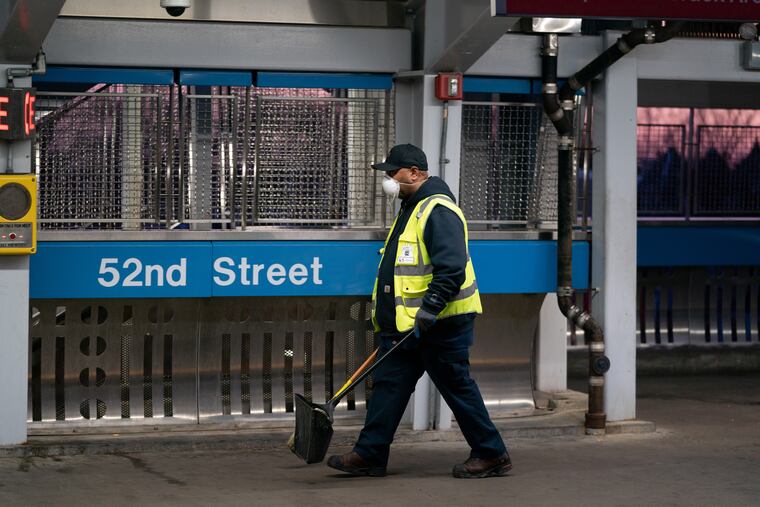A year into COVID-19, taking stock of the protections workers won — and those they still need | Editorial
The issues for frontline workers now are paid sick leave, hazard pay, and the minimum wage.

The coronavirus has not only reshaped our lives, but redefined work for everyone. That doesn’t exclude those lucky enough to shift to working remotely, but the real burdens have fallen on those who lost their jobs, as well as those who found themselves on the front lines overnight. The system has failed to protect those workers.
Now that we’re a year into the pandemic and hopefully starting to turn the corner, it’s a good moment to pause and assess what has been achieved and what more needs to be done for workers who have borne its brunt.
Last week, Democrats in Congress passed the $1.9 trillion American Rescue Plan. House Democrats passed the PRO Act, a bill to bolster workers’ ability to organize. In Pennsylvania, the Labor and Industry Department announced the hiring of at least 500 people to respond to unemployment claims — hopefully addressing a staggering backlog.
» READ MORE: During a year apart, these workers were too essential to isolate. This is how they’re doing now.
For the workers most impacted by the pandemic, either those who continued to work on the front lines or those who lost their jobs, the American Rescue Plan is a life preserver. The package extends unemployment benefits into September, sends $1,400 checks to most people, temporarily expands the child tax credit, and allocates billions for rental assistance.
According to an analysis by the Urban Institute, the American Rescue Plan is going to cut in half the poverty rate for those who lost a job during the pandemic.
» READ MORE: What’s in the stimulus bill? Here’s how you can benefit, from checks to healthcare to tax credits and more.
Federal, state, and municipal governments all had roles to play in helping workers. Philadelphia’s City Council also stepped up. Last March, nearly all hospitality, stadium, and airport food workers in Philadelphia found themselves unemployed overnight. In December, Council enacted the Black Workers Matter bill package to provide job security to these thousands of workers. The bills, championed by Helen Gym, Isaiah Thomas, and Kenyatta Johnson give the laid-off workers first dibs for their job when the stadiums, hotel, and airport vendors reopen, even in cases when the employers changed.
Last June, Council also enacted a bill making Philadelphia the first city in the U.S. to protect workers who blow the whistle on coronavirus-related public health violations and allow workers to refuse unsafe work assignments without fear of retaliation.
Thanks to these protections and investments, all workers are in a better position now than they were just a few months ago. But more protections are needed if we really accept that frontline workers are heroes that deserve applause.
The messy vaccine rollout has left many frontline workers vulnerable, particularly those not represented by a union that can help arrange vaccinations. Last week, the number of COVID-19 vaccines administered nationwide per day topped two million. But vaccine distribution must ramp up to protect essential workers.
The issues for frontline workers now are paid sick leave, hazard pay, and the minimum wage.
Workers — especially those who work in security and grocery stores, nursing homes and cleaning services — were put at risk because of the coronavirus. A Wharton and International Blue Cross study published last week found that essential workers were 55% more likely to contract the virus than those who were able to work from home. That risk hasn’t been reflected in pay. Hazard pay to address that gap has been absent from federal and local legislation. Last July, Gov. Tom Wolf set aside $50 million from the CARES Act for a hazard pay gap program that helped workers of 600 employers. That program hasn’t been funded since.
» READ MORE: If D.C. won’t increase minimum wage for Pa., Harrisburg should | Editorial
Similarly, Philadelphia’s emergency paid sick leave ordinance expired in December. Councilmember Kendra Brooks reintroduced the legislation. Council could vote on it in the coming weeks. There are multiple paid sick leave bills in Harrisburg that Republicans have refused to consider.
These protections should extend beyond the current crisis.
Safety is important, but so is a decent livelihood. The wage in many of these critical and now risky jobs is too low. The $15 an hour minimum wage provision didn’t make it into the final congressional package, but nothing prevents Pennsylvania, where cost of living exceeds the minimum wage in every county, from taking action.
With the pandemic’s possible end in sight, America must decide: What kind of norm are we willing to accept? The norms of lax worker protections, high poverty rates, and child hunger are unacceptable. The big investment that our government is making to help people directly should be the new norm.